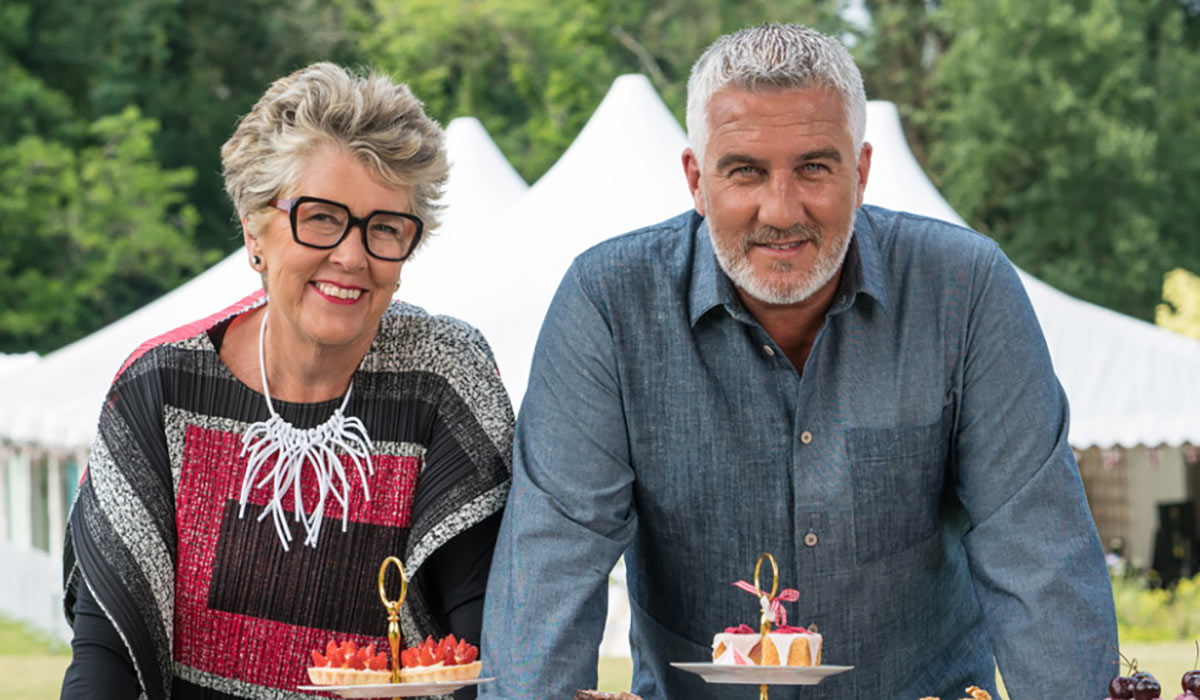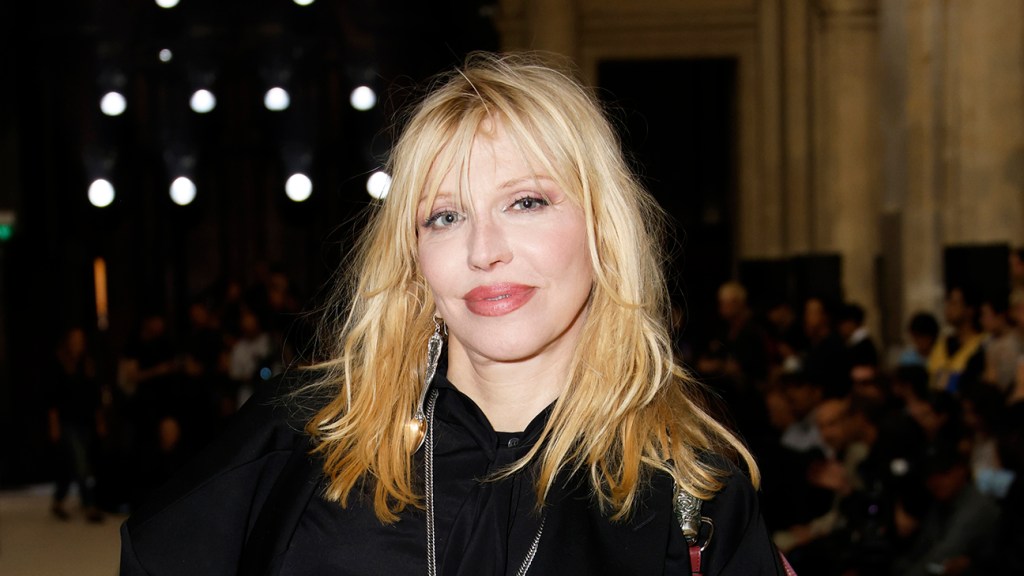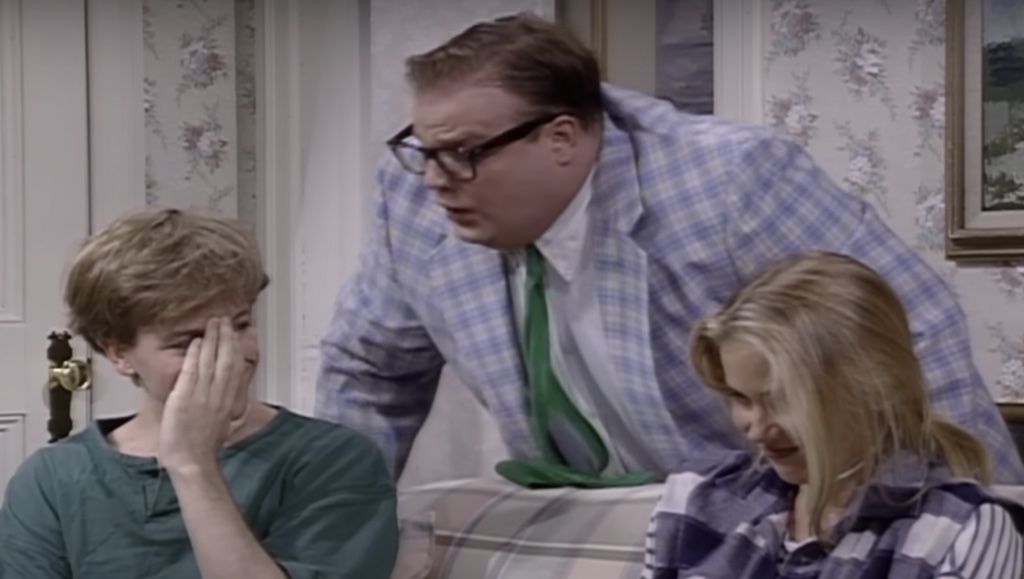
Paul Hollywood And Prue Leith Brings Everyone’s Favorite Baking Show’Back To America [Interview]
Feb 20, 2023
Often, no matter how busy you are, there are interview opportunities you just cannot turn down. Beyonce? Name the time and the place. Angelina Jolie? Standing by. RuPaul Charles? Always. So, even during this busy awards season when someone offers you “Great British Bake-Off” (or “Great British Baking Show” as its known in the U.S.) judges Paul Hollywood and Prue Leith you absolutely find a way to make it happen.
READ MORE: “Weird: The Al Yankovic Story”: Daniel Radcliffe and director Eric Appel on making a parody of music biopics, working with Al and more [The Discourse Podcast]
The duo reunited in their off season to chat about their new “The Great American Baking Show Holiday Special” which is now available on The Roku Channel. There were a number of season of “The Great American Baking Show,” on ABC, but the last season was in 2019. Next spring, a new version of the series hosted by Ellie Kemper and “Severance” star Zach Cherry will be released on Roku (Kemper and Cherry are a breath of fresh air compared to current “British” hosts Matt Lucas and Noel Fielding). The new one-shot special features U.S. celebrities competing for their favorite charities including Chloe Fineman, Nat Faxon, Marshawn Lynch, D’Arcy Carden, Joel Kim Booster, and Liza Koshy.
Paul and Prue spoke for 20 minutes with The Playlist, but we could have honestly chatted with them for another hour or more. We didn’t even get to ask them about the infamous Mexican week from season 13 this past summer!
_____
The Playlist: I know an “American” version of theshow hasn’t been on the air for a couple of years, but the “British” one is available on Netflix and people watch it here religiously. Are you aware of how many people watch it here in the States?
Paul Hollywood: No, to be honest. I know it’s popular. I was over in the States in July promoting a book. So, I was in New York for a week. And it was weird because I was walking through New York, and I was going from a thing. I was leaving a studio and walking somewhere. And then loads of people were stopping me and saying, “Oh my God, the ‘Great British Baking Show.’” I was like, “What?” It was very odd being recognized in the big cities in America. Very odd.
Prue Leith: It’s very interesting. Because when you think how many millions of people there are in America, you think a television show would get lost. You wouldn’t have many fans. I have been stopped. I’m in the States at the moment. I’m in New York, and I have been here for two months. Even in the middle of Texas, in a one-horse town, I’d be stopped. I’ve been stopped more in America than I ever am in England. It’s a huge success here.
The Playlist: Well, Prue, since you’ve been here over the past two months, that means you were here when the last season ended, where the last episodes came out.
Prue Leith: Absolutely. I was.
The Playlist: Have you been approached by people questioning your choices at all?
Prue Leith: A few, a few. But most of them agreed with us. There were some huge Abdul fans, but people are very generous about “Bake Off.” I think the audience is much like the people in the show. Nobody is out to humiliate or upset anybody. It’s very friendly, and the fans are friendly too. When I was doing “The Great British Menu,” which was a different show altogether, I used to get stopped much more with people saying, “I don’t agree with you. That cake was absolutely fantastic.” And I remember once in the supermarket, I said, “But how do you know it tasted terrific?” And they said, “Well, I could see it was delicious And you didn’t rate it. You said it had too much lemon in it. I didn’t. It was wonderful.” Well, you can’t argue with somebody who’s convinced the cake they saw on tele was perfect.
Paul Hollywood: Oh, I would. [Laughs.]
The Playlist: Before I quickly get to the holiday version of the show, you also just shoot a season with amateur American bakers. And, Paul, you’ve obviously done a number of seasons of these before. And is there inherently something different in terms of just the talent, or maybe tendencies, of the American contestants versus the UK ones, in terms of how they bake or the choices they make?
Paul Hollywood: I think two things, really. One, they do tend to be a little bit sweeter than the UK brothers and sisters. And I also think certainly having seeing five or six of the American ones, they are getting much better. The American bakers now, are very good. Certainly equate to the UK relatives. So I think there’s room for an international bake off.
The Playlist: Have there been conversations about inviting European contestants?
Paul Hollywood: I think at the moment there’s 17 or 19 varieties of “Bake Off” all around the world. There’s one in Peru, Brazil, Italy, Israel, Denmark, Belgium, Australia. They’re literally all over the world. And I was approached to do a couple of them in the past, and I just said, “I can’t spend my life traveling around doing Bake Offs. I don’t even speak the language.” But I’ve caught up with a couple of them recently, that the standard is getting better because the more program goes out, the more it appeals to the decent bakers that want to challenge themselves. I do think that the American bakers have done a fantastic job.
Prue Leith: I think your question about is there a difference between the American and the Brit, what has surprised me is there hasn’t been a difference in attitude. The American bakers have been just as cooperative, just as helpful to each other, just as they weren’t trying to undermine each other or anything. They behave exactly in the same spirit of “Bake Off” in the “American Baking Show” as in the other one. But what I do think is different is that Americans generally have more tolerance for very sweet things. They like sugar, more tolerance for sugar than, I think, the Brits do. And I think we like sugar a lot, but they like it really a lot. And the other flavor I think you have more in America than you do in the U.K. is cinnamon. Cinnamon turns up a lot in American, even in granola for breakfast. There’ll be a lot of cinnamon. And the American tolerance for chili. I think it’s probably the Mexican influence because you share a border with Mexico. I find that sometimes American food is a bit too spicy for me. I like it spicy, but not that spicy. But I think there are a little bit of flavor differences. But as Paul often says, the American tastes and ways of techniques of baking are European because that’s where they came from. The exception perhaps a flatbread, which came from probably from America…
Paul Hollywood: Well, that came from the South America up, the bread side of things. But the cakes and all the pastries came from Europe over, and it’s been changed over the years. It’s been tweaked and changed and Americanized, but it’s still very good. But you can source. I love seeing recipes that someone’s had in the family for a long time. And then I can look at a recipe and go, “I know that recipe.” And some of them go back to a village in Wales, like a Bara Brith, a heavy fruit bread. Or a Dundee cake from Scotland, or croissant or a Danish pastry. And you spot them, and I can say, “Can I see your recipe?” And I can see the similarities and you go, “Where’s your family from?” And then you start, “Oh, we’re from Scotland.” “Yeah, I can see that.” It’s really odd. We’re a small world, actually. We’re not as big as you think.
The Playlist: In a way that leads to my next question, and we may be one more season of either of you being able to provide an answer to this, but during the pandemic, so many people were stuck at home. And they were baking and cooking for the first time. Have you seen these new bakers yet on the show? People who recently just got into it because of what the world went through?
Paul Hollywood: Absolutely. They got into it through COVID, through lockdown. And they started baking, got into it, and really loved it and wanted to do the baking show and get on there.
[Paul’s zoom screen freezes and he departs the conversation for a few minutes]
Prue Leith: One of the interesting things in Britain, and I’m sure it’ll be the same in America, is that we have had an absolute little explosion of new bakery businesses, artisan bakeries popping up all over the country as a result of “Bake Off.” Because people got obsessed with making sourdough bread or cinnamon buns or something or other. And they’ve started to sell them, and it turned into a bakery. I know a cameraman who’s given up filming, and he is now running a bakery. And in fact, I know two people who’ve done that. So I think COVID has given a huge boost to…
Paul Hollywood: Sorry. I dropped out there somewhere. I think my wifi went down.
Prue Leith: It did. It’s all right. We had a lovely picture of you completely frozen.
The Playlist: Don’t worry. It’s a print interview. No one will ever see it. But, Prue, you were just talking about how there’s been an explosion of bakeries and artisanal businesses in the UK after COVID. And, Paul, you were in the middle of talking about how you had seen an explosion in contestants. And I guess just to wrap this part of the conversation up, is do you think this has lead to more talented baking contestants? Or does the skill levels seem consistent?
Paul Hollywood: I think it’s down to the fact that COVID encouraged people to try to something different, and they realize they have a talent. And I think from then on in, they really got into it, and it became this real passion project for them. And then to see them, in a sense, because of it is fantastic. And new bakers often have different ideas and different techniques because they’re brand new. And so even though they may think it’s the correct method, it’s not. But they’ll end up with something that’s amazing. You go, “How in the hell did you do that?”
Prue Leith: Quite often they learn stuff on YouTube from each other. Baking becomes a really sharing occupation. But I think, in fact, Paul, I think you said this a little while ago. You said that you thought that the standard of both the British and the American bakers had improved terrifically because of the fact that people have had more time to practice.
Paul Hollywood: Yeah, absolutely. Weirdly during COVID, I saw banana bread trending. I’m going, “What? How does banana bread trend?” When you’re seeing things like that, you’re thinking baking’s got everybody. And I think it’s very much a comfort thing. Now, if you are at home, you’ve got some ranked bananas just on the turn, and you put that inside a cake and you make a beautiful banana cake with walnuts in, or just plain, and you smell that when it’s baking. And when it comes out the oven and you take a slice and have it with a cup of tea, it’s just a thing. It’s a comfort thing. It’s the blanket. It’s the comfort. It keeps you safe. And I think if baking has something like that which helped people during COVID, it’s done its job.
Prue Leith: Well, it’ll be very interesting to see, now that we are all back to stress and probably more stress than before COVID because we’ve got water and economic collapse and all other things to contend with, do you think that in the next two years our bakers are going to get worse?
Paul Hollywood: They need to bake to get better.
The Playlist: I think that’s one reason why many people in the of us are excited about new U.S. seasons is because watching the original version on Netflix has been an escape from what’s happening in the world. Is that the feeling you get when you meet people around the world? Is the show their comfort food?
Paul Hollywood: Yeah.
Prue Leith: People tell us all the time. They’ll tell us, “During COVID, ‘Bake Off’ saved me. It was my moment when I could stop worrying about trying to teach the children, or cope with the fact that my husband was at home all the time.” Or whatever it was that was bugging them. For that hour, the whole family was shut up and watch the “Bake Off,” and in a spirit of friendly love, really. Yeah.
Paul Hollywood: And I’ve met a lot of people who, weirdly, I was in the loo, and I was in a restaurant in the Alps, French Alps, and I went to the loo. And when I was in the loo, the people came in, and then he went, “It is. It’s the guy from… It’s Paul Hollywood!” But in quite a strong accent. And I turn around and said “Hello.” And they went, “We’re from Brazil. We’re massive fans. You helped us.” One of their family members had died, and they found “Bake Off.” And found it really comforting and a great part, and they really got into baking. And through baking, they got over this bereavement in the family. And I was like, “Oh wow. It really…” But one, I was in the middle of nowhere in the loo, and I thought this is really odd. And the Brazilians loved “The Great British Bake Off,” and I just thought it was crazy the way that it hits people in different ways.
Prue Leith: I was at the races, and this happened two or three times to me. You go to a restroom. You’re in the restroom, and suddenly somebody recognizes you. And they all want to take selfies, and I will not have a selfie of me taken with the background that says, “Ladies lavatory.” Or, “Please wash your hands.” It happens all the time, but I’ve got very firm about it. I say, “Please could you go outside, and we’ll do it in the corridor outside.”
The Playlist: When decisions are being made about the challenges is the fact they may be baked in a hot tent taken into account? That it might affect the outcome? Or is it just, “Everyone’s in the same bubble. May the best contestant win”?
Paul Hollywood: It’s interesting. That came up in a conversation when we were choosing the challenges, and they said, “What week is this?” And he went, “Oh, it’s going to be week six.”
“Hang on. They’re using chocolate. That’ll take us into that month…” “Well, that could be quite hot.”
So yeah, we have looked at that in the past, but they do have fridges to use. We haven’t got air conditioning in the tents, but they do have fridges they can use. And sometimes they will alter it around and knock things around, so the earlier the better to get the stuff they can melt very quickly, get that out the way earlier rather than later.
Prue Leith: The fact is that sometimes it is absolutely boiling in that tent, and everything melts.
Paul Hollywood: Then it’s freezing.
Prue Leith: And then absolutely freezing. And you’re having to hold hot water bottles underneath our players to try to stay warm. And people often say to me, “Why else do you do it in a tent? You must know that the whole problem with a tent is it gets too hot, and it gets too cold.” But that’s the point. It’s a village tent. The whole thing started as the feeling of a village fete. The festival. We would never change that. And it lends to the excitement and the challenge of a thing.
The Playlist: For each individual season, there’s numerous challenges, numerous dishes they have to make. I don’t know how involved you both are in terms of that, but they must ask your opinion on what they’re going to be doing. How many weeks are you starting beforehand going over emails and meetings about what things should be?
Paul Hollywood: They’ve already started now for next year.
The Playlist: And it’s December.
Paul Hollywood: Sometimes I’ll see something and go, “Now, that will make a great technical challenge.” And then I’ll email something off to the gang. But they’re having meetings, first meetings, about now just getting some broad ideas down. So by the time January, February, March comes, February we start getting more intense. And then they go through a lot of the criteria. They look at Prue’s books. They look at my books. And then they’ll put 10, 20, 30, and that’ll go on a chart, which will be sent to us. And then we have a look through. And then we’ll say yes to that one, no to that one. And then it starts to come to something. But they need to get the recipes, the ideas, the challenges out to the bakers as early as possible. So by the time we come to filming, there are plenty of time to practice.
Prue Leith: Don’t forget. There’s months and months of choosing the bakers. There’s a huge process of the bakers applying online and then sifting the best applications, and then gradually finding out if they really know about baking and talking to them. And then finally, they send in their bakes, and they get to an audition. It takes months and months to choose the bakers, and it takes months and months to get the challenges right.
Paul Hollywood: Yeah.
Prue Leith: Paul and I are involved and checking in. We don’t actually do any of that work because it’s probably got a team of 50 people doing it.
Paul Hollywood: Yeah.
The Playlist: Let’s talk about this Holiday special for the new “American Baking Show.” I know you both worked with celebrities many times on “Bake-Off” before. Do you feel like you have to be more leniant when you judge them on a special like this? Do you feel like you’re holding your hand behind your back?
Paul Hollywood: Yeah, personally, I’ll judge them the same. But I will help them out. If I see something going wrong, I will step in and help them. I’ve done that before, and I’ll carry on doing that because these guys didn’t sign up to be bakers. They’re actors. They’re comedians. They’re whatever. So, I think it’s cruel. I think if I can see something obviously going to go wrong, they normally look at me with the puppy eyes, and then I’ll go over and help them.
Prue Leith: No, me too. I think we do help them a bit because, obviously, the show could grind a halt if somebody absolutely doesn’t know what they’re doing. So, we can help them, but, which we never, ever would help anybody on the main show because they are expected to know what they’re doing. And I think I would say our standards are not quite so high for the celebs because they’re not going to have any icing skills, although sometimes they surprise us. Either because they have had some practice. Or because they’re artists, and they know how to handle paint or clay or something. And it turns out they can handle marzipan or icing.
“The Great American Baking Show’s Holiday Special” is now available on Roku. You can watch it here.
Publisher: Source link
Olivia Rodrigo Joined No Doubt, And Many, Many Other Artists Had Surprise Cameos At Coachella 2024
This year had some of the best surprise guests.View Entire Post › Disclaimer: This story is auto-aggregated by a computer program and has not been created or edited by filmibee.Publisher: Source link
Apr 18, 2024
Cute Kate Spade Mother’s Day Gifts That’ll Make You the Favorite
We independently selected these deals and products because we love them, and we think you might like them at these prices. E! has affiliate relationships, so we may get a commission if you purchase something through our links. Items are…
Apr 18, 2024
Khloé Kardashian Just Cut Her Hair The Shortest I've Seen In A While
It's the perfect warm weather cut.View Entire Post › Disclaimer: This story is auto-aggregated by a computer program and has not been created or edited by filmibee.Publisher: Source link
Apr 17, 2024
See Inside Emma Roberts’ “Storybook” Home
Just one look inside Emma Roberts' home, and you may be left screaming with delight. The Scream Queens alum recently opened the doors to the Los Angeles pad she shares with her 3-year-old son Rhodes. "What I love about this house is it speaks…
Apr 17, 2024











